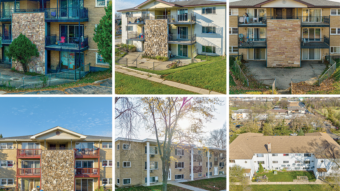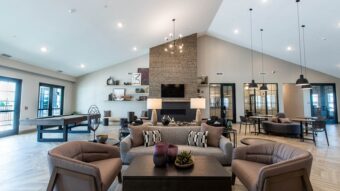Chicago-based integrated design and delivery firm Wight & Company has completed the Prairie Activity and Recreation Center (PARC) for the Plainfield Park District. Designed as a net zero facility, the 37,000-square-foot building in southwest suburban Plainfield, Illinois is projected to be the first building of its kind to achieve the Passive House Institute US PHIUS+ Source Zero certification.
“It is exciting to be able to bring to the Plainfield Park District and its community an innovative recreation facility that will not only provide a home for its preschool and a place for its basketball and fitness programs, but to also successfully meet their goal to be good environmental stewards,” said Lois Vitt Sale, chief sustainability officer at Wight. “Designed to be both Passive House US certified and a Net Zero Energy Building, this building will be the first of its kind in the U.S.”
PHIUS+ certification involves a rigorous set of design principles that work with building systems, insulation and windows to create an air-tight structure that keeps the indoor temperature consistent every day of the year, regardless of weather. Built to such ambitious standards, these buildings require little energy for heating or cooling. Adding Source Zero certification to PHIUS+ requires that on an annual basis, a building must generate an amount equal to or greater than the energy consumed in the building.
The two-story building includes a 4,000-square-foot fitness center and studio with a full-size basketball court, elevated 10-lap walking track and a 1,600-square-foot multi-purpose room for classes and special events. A preschool suite, featuring a dedicated reception area and entrance, offers four classrooms with high windows and “look nooks,” where low picture windows connect children to the natural surroundings outside. Anticipating the possibility of adding an aquatics facility in the future, the design team at Wight & Company sited the building to allow for future expansion.
As built, the PARC is 65 percent more efficient than a conventional commercial building of the same size in a similar climate. To achieve Source Zero certification, the building will use a 28,600-square-foot array of solar panels to generate energy. On days when the solar panels are unable to produce power at full capacity, the building will draw from the energy grid. This draw will be offset by the surplus power the building’s solar panels will provide to the energy grid on sunny or partially sunny days. Additionally, as a result of its highly insulating building envelope, the PARC will use minimal energy for heating and cooling while keeping the indoor temperature consistent. A building performance monitor at the front entry will share building energy use and solar energy production with visitors.
The Plainfield Park District secured a $1 million grant through the Illinois Clean Energy Community Foundation’sNet Zero Energy Building Program, which will offset the additional expenses associated with the design and construction required to achieve net zero status. In addition to its net zero design, PARC includes sustainability features such as LED site lighting and rain gardens with native landscaping. Other exterior features include parking for 110 vehicles, walking trails and a recreation patio for preschool games and outdoor learning. The PARC is the latest addition to the Bott Park complex, which includes amenities such as a playground, ball fields and soccer fields.
“We knew we had a short window in which to design and construct a new multi-faceted recreation center and believe Wight & Company was an ideal choice based on the firm’s design and delivery capabilities, which integrated the design, engineering and construction professionals working on PARC into a single team,” said Carlo Capalbo, MPA, CPRE, executive director at the Plainfield Park District. “The result was a simplified process that enabled us to make the most of our budget and benefit from the full scope of a design/build project.”
Wight has a long history of leadership in sustainable design and active contribution to the green building movement. The firm was a founding member of the U.S. Green Building Council and among the first signatories of the AIA 2030 Commitment, which seeks to move the industry toward carbon-neutral buildings, developments and renovations by the year 2030. Wight has completed more than 80 LEED-registered and certified projects, including the LEED Platinum-certified Sunset Ridge School in Northfield, Illinois.



